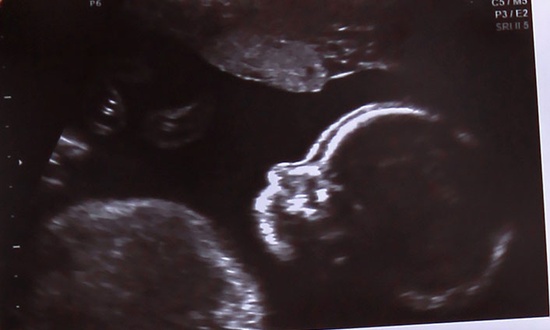The following is one of 39 prochoice arguments, followed by a prolife answer, taken from Randy Alcorn's ProLife Answers to ProChoice Arguments (Multnomah Press, 1992, 1994).
| 17. "I'm personally against abortion, but I'm still prochoice. It's a very difficult decision, but it's a legal alternative and we don't have the right to keep it from anyone." |
17a. The only good reason for being personally against abortion is a reason that demands we be against other people choosing to have abortions.
Prochoice people are constantly saying "abortion is a very difficult decision" and "it's a heartwrenching choice for a woman to have to make, so let her make it in peace." The logical response to this is to ask "Why is abortion such a difficult decision? I don't get it. Please explain it to me."
If they hesitate to respond, as they often do, the follow-up question is, "If it's just a blob of tissue, if it's not really a child, then it should be no more difficult than choosing to have your appendix removed. Right? So what is it about abortion that makes you say it is so difficult and heartwrenching?" If a person is honest, there is ultimately only one answer to the question. Abortion is a difficult decision for one obvious reason—it is the killing of an innocent baby, one's own child.
If abortion doesn't kill children, why would someone be personally opposed to it? If it does kill children, why would someone defend another's right to do it? The position of being personally against abortion but favoring another's right to abortion is therefore self-contradictory and morally baffling. It's like saying—exactly like saying—we're personally against child abuse, but we defend our neighbor's right to abuse his child if that is his choice.
17b. To be prochoice about abortion is to be pro-abortion.
Suppose drug-dealing were legalized, as some have advocated. Then suppose you heard someone argue this way about selling cocaine:
I'm personally not in favor of drug-dealing, but this is a matter for a drug-dealer to decide between himself and his attorney. Lots of religious people are against drug-dealing, but they have no right to force the anti-cocaine morality on others. We don't want to go back to the days when drug-dealing was done in back alleys and people died from poorly mixed cocaine, and when only rich people could get drugs and poor people couldn't. It's better now that qualified drug dealers can safely give cocaine to our children. I personally wouldn't buy drugs, so I'm not pro-drugs, you understand, I'm just prochoice about drug-dealing.
In terms of the bottom-line, there is no significant difference between people who are in favor of drug-dealing and people who don't like it personally but believe it should be an option. Someone who is prochoice about rape might argue that this is not the same as being pro-rape. But what is the difference, since being prochoice about rape allows and effectively promotes the legitimacy of rape?
Those who were prochoice about slavery fancied that their moral position was sound since many of them didn't personally didn't own slaves. Yet it was not just the pro-slavery position, but the prochoice-about-slavery position, that resulted in the exploitation, beatings and deaths of innocent people in this country. Similarly, most people in Germany did not personally favor the killing of the Jews. However, they did nothing to try to stop that killing.
In ancient Rome it was legal for fathers to kill their newborn children by setting them out to die of exposure or be eaten by wild beasts. While many people would not do this with their own children, they recognized the rights of others to do so. The early Christians saw this "right" as a wrong, and when they could find such children they took them into their homes to care for them.
Some people have the illusion that being personally opposed to abortion, but believing others should be free to choose it, is some kind of compromise between the pro-abortion and prolife positions. It isn't. Prochoice people vote the same as pro-abortion people. Both oppose legal protection for the innocent unborn. Both are willing for children to die by abortion.
Those who are "prochoice" are by definition willing to extend the right of choice to the arena of killing babies. They must therefore take responsibility for the killing of those babies even if they do not participate directly—just as those who are prochoice about crimes of racism must take responsibility for those crimes even if they do not personally commit them. To the baby who dies it makes no difference whether those who refused to protect him were pro-abortion or "just" prochoice.
17c. What is legal is not always right.
One of the weakest arguments for the legitimacy of abortion is the fact that it is legal. Civil law does not determine morality. Rather, the law should reflect a morality that exists independently of the law. Can anyone seriously believe that abortion was immoral on January 21, 1973 and moral on January 23, 1973? If abortion killed children before the law changed, it continues to kill children after the law changed. Law or no law, either abortion has always been right and always will be, or it has always been wrong and always will be.
Our country's history is full of examples of legal things that were not right. Perhaps the most notable example is slavery. In the last century the slaveowners argued that the slaves were theirs and they had the right to do with them as they wished. They claimed that their personal rights and freedom of choice were at stake. They said that the slaves were not really persons in the full sense. They pointed out that they would experience economic hardship if they were not allowed to have slaves, and developed slogans to gain sympathy to their cause. They maintained that others could choose not to have slaves, but had no right to impose their anti-slavery morality on them. And above all, they argued, slavery was perfectly legal, so no one had the right to oppose it.
This point of view was given further legal support in the Dred Scot decision of 1857. The Supreme Court determined in a 7-2 decision that slaves were not legal persons and were therefore not protected under the Constitution. In 1973, one hundred and sixteen years later, the US Supreme Court, by another 7-2 decision, would determine that unborn children also were not legal persons and therefore not protected under the Constitution. The Chief Justice of the Supreme Court said in 1857, "A black man has no right which the white man is bound to respect." Despite slavery's legality, however, Abraham Lincoln challenged its morality. He said, "If slavery is not wrong, then nothing is wrong."
In the 1940's a German doctor could kill Jews legally, while in America he would be prosecuted for murder. In the 1970's an American doctor could kill unborn babies legally, while in Germany he would be prosecuted for murder. Laws change. Truth and justice don't.




